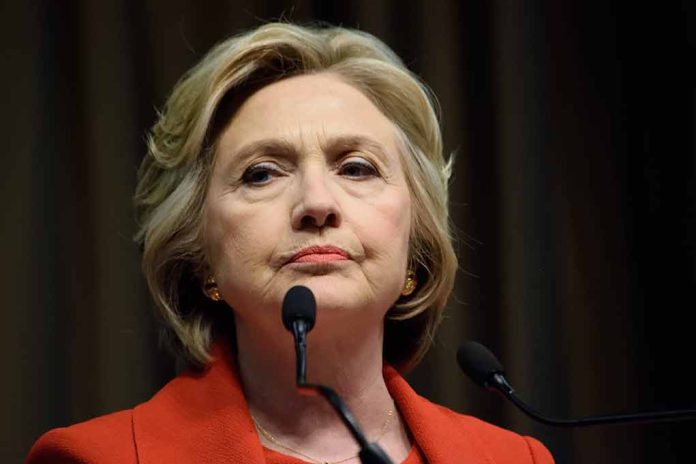
Obama-appointed Judge James Boasberg shielded Hillary Clinton’s 15,000 controversial emails from public scrutiny until after the 2016 election, raising serious questions about judicial impartiality in politically consequential cases.
Key Takeaways
- Judge James Boasberg, appointed by Obama, ruled that most of Clinton’s recovered emails wouldn’t be made public until after the 2016 Election Day.
- The State Department was ordered to process only a small fraction of Clinton’s emails before the election, despite lawsuits from Judicial Watch under federal disclosure laws.
- Boasberg’s actions regarding Clinton’s emails contrast with his approach to the Trump administration’s cases, suggesting potential partisan bias.
- The judge is currently presiding over high-profile cases involving the Trump administration’s deportation policies and a Signal app communication lawsuit involving top officials.
Clinton’s Emails Sheltered From Voters
U.S. District Judge James Boasberg established a timetable that effectively prevented American voters from seeing thousands of Hillary Clinton’s recovered emails before casting their ballots in 2016. After the FBI investigation into Clinton’s private email server discovered approximately 15,000 previously unreleased emails, conservative watchdog group Judicial Watch filed lawsuits to make these communications public under federal disclosure laws. However, Boasberg’s ruling ensured that most of these potentially damaging documents would remain hidden until after the election had concluded.
The State Department was instructed to process only a small portion of the emails before Election Day, with the vast majority scheduled for release afterward. This decision sparked immediate criticism from transparency advocates who argued that voters had a right to this information before making their choice at the ballot box. The timing raised serious concerns about whether judicial power was being wielded to protect a specific political candidate from scrutiny.
Pattern of Controversial Rulings
While some legal observers describe Boasberg as fair and principled, his record shows a pattern of rulings that have significant political implications. Beyond the Clinton email decision, Boasberg has recently been at the center of controversy regarding President Trump’s immigration policies. He issued an injunction halting deportation flights of Venezuelan gang members, ordering a plane that had already departed to return to the United States—a decision that prompted sharp criticism from the administration and its supporters.
“Well I think there’s a lot of people who think there’s a bias. After all, as you mentioned Benny, this is the guy who said, ‘turn the flight around, bring all the bad guys, the hardened criminals who were here illegally who did terrible things, bring those folks back to America.’ This is the judge who was there on the FISA court when they issued the warrants to spy on President Trump’s campaign eight years ago. So, there’s a history there and yet no, no recusal, he’s going to get the case,” said Republican Representative Jim Jordan.
Boasberg’s involvement has expanded to include a new lawsuit regarding the use of the Signal messaging app by high-ranking Trump administration officials. This case, filed by American Oversight, accuses Defense Secretary Pete Hegseth, CIA Director John Ratcliffe, Director of National Intelligence Tulsi Gabbard, and Secretary of State Marco Rubio of violating the Administrative Procedure Act and Federal Records Act. The assignment of this case to Boasberg has intensified skepticism among Trump supporters about the randomness and fairness of the judicial assignment process.
Questions of Judicial Neutrality
Criticism of Boasberg’s handling of the Clinton email case centers on the apparent double standard in his judicial approach. While he showed considerable deference to the Obama administration by accepting their slow processing timeline for Clinton’s emails, his treatment of the Trump administration’s policies has been markedly different. President Trump himself has criticized Boasberg, calling him a “Radical Left Lunatic Judge” and even suggesting impeachment—remarks that prompted a rare rebuke from Chief Justice John Roberts.
Judicial Watch President Tom Fitton characterized the email release process as corrupt, arguing it deliberately deprived the public of information they had a right to know before voting. Despite Boasberg’s efforts to delay the email releases, he couldn’t prevent the discovery of Clinton’s emails on Anthony Weiner’s laptop, which led then-FBI Director James Comey to reopen the investigation days before the election—an “October surprise” that many analysts believe significantly impacted the race.
A Judge With Establishment Ties
James “Jeb” Boasberg’s professional background reveals deep connections to the Washington establishment. Appointed to the federal bench by President Obama in 2011, he later served on the Foreign Intelligence Surveillance Court (FISA Court) during a period when controversial surveillance warrants were approved against figures connected to the Trump campaign. He also has close personal ties to Supreme Court Justice Brett Kavanaugh, having been law school roommates.
“Boasberg is the opposite of a radical judge… He is principled and fair,” said one former Justice Department prosecutor.
While defenders praise Boasberg’s conventional approach and social demeanor, critics point to his handling of politically sensitive cases as evidence of partisan leanings. As Chief Judge for the federal court in Washington, DC, his decisions have far-reaching implications across numerous high-stakes political and legal disputes. The controversy surrounding his judicial philosophy illustrates the broader tensions about the role of judges in politically charged cases and whether true impartiality is possible when handling matters with such profound partisan implications.
Sources:
- Who is James Boasberg, the judge in Trump administration immigration fight? | Reuters
- Judge James Boasberg had nonpartisan record before facing Trump’s fury | CNN Politics
- MAGA Questions Judge Boasberg Assignment to Signal Lawsuit: ‘Rigged’ – Newsweek
- Can You Guess Which Judge Protected Hillary by Delaying Release of 15k of Her Emails Until After the 2016 Election?



